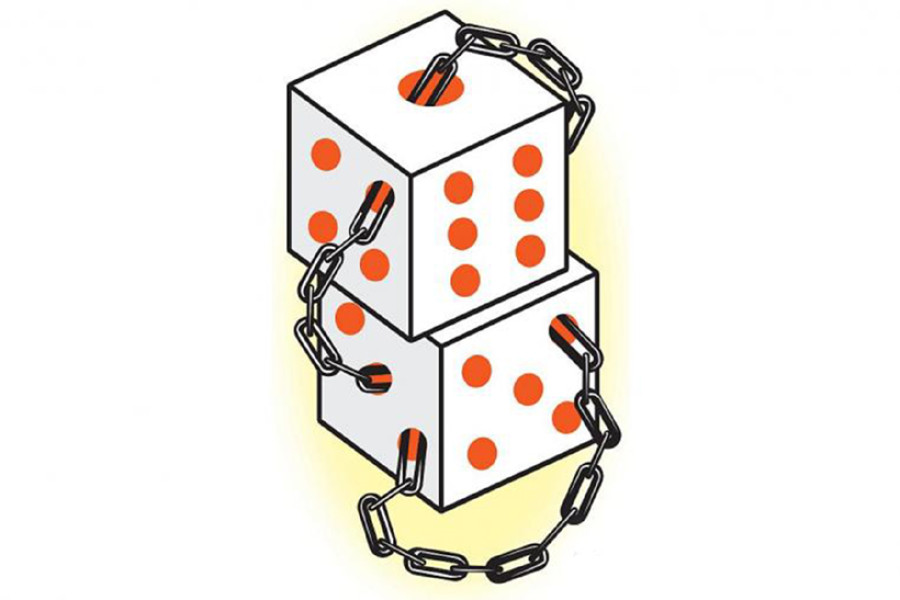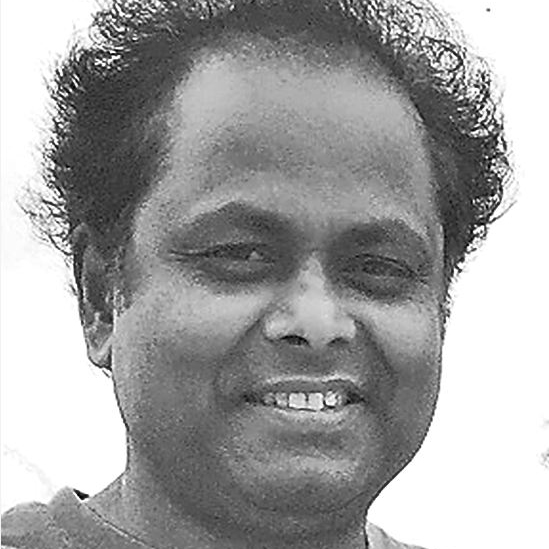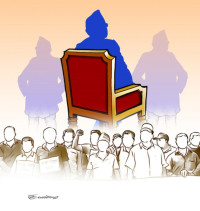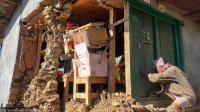Opinion
Same old paradigm
Existing political parties have become structurally incapable of reinvigorating ideas
Pramod Mishra
On January 1, I posted two tweets: “Happy New Year to Nepal! May 2016 bring reconciliation, peace and lots of cooking gas to every stove and petroleum to every vehicle!” and “May this new year bring new leaves, new thoughts and new political forces!”
New leaves, of course, will sprout every spring as before, no matter what, at least until global warming does something to it. Sooner or later, cooking gas and petroleum, too, would find their way into urban kitchens and petrol pumps once the current blockade eases. But why is this cry for new thoughts and new political forces? Does the key to cooking gas and petroleum along with peace and reconciliation hinge on new thoughts and political forces?
When the monarchy ended, most Nepalis had hopes of a new dawn of freedom and plenty. But the crisis Nepal faces now has belied those hopes. The crisis does not just stem from a turmoil here today and another disturbance there tomorrow. It is multidimensional and pervasive, oozing from every pore of the body politic. And the dominant ideas and existing political parties have miserably failed to address it. The nature of the crisis has escalated to unforeseen levels but the dominant ideas still remain of the last 50 or even 250 years, and the dominant political formations have become structurally incapable of reinvigorating ideas and new generational leadership. They have become rotten to the core.
Koirala vs. non-Koirala
Here are a couple of representative examples to make my point. The Nepali Congress party will be holding its party convention soon. Held every four or five years, each convention sets the mood for the next half a decade and hopes that the new leadership will address the country’s challenges by implementing fresh ideas endorsed by the party cadres and delegates. But the party is singing the same old song: Koirala vs. non-Koirala, as though the Koirala magic will still work after what we saw during Sushil Koirala’s tenure both as the party president and the country’s prime minister. In the younger generation of Koiralas, who is there with a grounding in ideas, training in world renowned educational institutions or, like their fathers, uncles and grandfathers, forged in the crucible of long and hard political struggles against colonialism, tyranny and autocracy? The touch of magic that stemmed from the twin alters of domestic political wilderness and Indian freedom struggle is forever gone.
Like the waning of the Nehru-Gandhi name and dynasty in India, why should anybody care about a Koirala name in 2016 to solve Nepal’s problems? Just the status of a medical professional or someone’s daughter would not be sufficient qualification to carry the day. And then you have the muscle-flexing non-Koirala duo: Sher Bahadur Deuba and Ram Chandra Paudel. What else is left in Deuba to contribute save creating obstacles in the country’s forward march for his ethnic and personal gains? I have not heard anything original or influential from Paudel either. Yet, they are the frontrunners for the upcoming convention. Whatever happened to Congress’s younger generation of leaders, some even US educated?
Bad to worse
CPN-UML is even worse in both its politics and idea formation. It has for all intents and purposes become the hub of ultra-conservatives, old nationalists, and ethnic slur-spouting mandarins. Kamal Thapa, the Panchayat-Monarchist front man against the People’s Movements of both 1990 and 2006, seems mild by comparison when you consider what these UML men have been saying and doing. Most Nepalis by now know PM Oli’s comparison of Madhesi killings to a few mangoes falling off the tree. As if that was not enough, he compared the longest human chain Madhesis formed in support of their demands with ‘makhe sanglo’. Combine this with Jhala Nath Khanal’s ‘Dhoti Pradesh’ epithet for the Madhes province and Madhav Kumar Nepal’s ignorant assertion, although he comes from Rautahat, a district adjacent to Bihar, that Indian Army does not recruit Biharis, and you have your UML top guns for you, spouting ground-breaking ideas. If that is not enough, please read UML Deputy Chairman Bhim Rawal’s January 1 op-ed piece in this paper and mark his tone and assertions. It appears as though he and his ilk are the only patriots left in Nepal and those demanding new dispensations are all traitors. Not even the worst Shah monarch in Nepal spouted all this. As for its younger generation of leaders, some are ideologically status quoist (nothing new has happened in Nepal for them since Madan Bhandari’s Janatako bahudaliya janabad), while others are clearly following the Oli line of ultranationalist bluster for quick popularity and rise.
But everything bad in this party got exposed in the Rajya Laxmi Golchha fiasco. A nominated UML member from the Madhesi quota, Golchha failed to show up to vote for KP Oli at the prime ministerial election on October 11, 2015. Consequently, when the UML, angered by this disloyalty, asked her to resign, she held a press conference and gave interviews in which she claimed that she had paid more than Rs 70 million to the party and individual UML politicians for a seat in the Constituent Assembly (CA), and so she would not resign. Many UML politicians refuted the charge. But then in a sudden turn-around, its party general secretary Ishwor Pokhrel offered special felicitation to Gochha at a public gathering not long after, clearly to muzzle further revelation and scandal. What is such quid pro quo wheeling and dealing in selling CA membership, if not the worst form of political corruption?
For a lesser charge of soliciting money to nominate the Illinois, USA, senatorial seat vacated by President-elect Barak Obama in 2008, the then Illinois governor Rod Blagojevich (2003-2009) was convicted and sentenced to 14 years in federal prison, which he is serving right now. When the party itself becomes corrupt, what is the remedy? All this makes me wonder how come I, a man of education and intellect, supported this party for so long?
One can go on documenting instances of corruption in multiple state institutions. Who and what can deal with all these messiness of democracy with an old political and cultural imagination? Will Baburam Bhattarai’s new political force or Bibeksheel Nepali’s overseas-educated young blood or Upendra Yadav-Ashok Rai’s new multi-ethnic coalition, the Sanghiya Samajwadi Forum Nepal, measure up to the challenges? I wish good luck to them. But I know for sure that there is the free media even though, save for one or two, its perspective is ethnically skewed. And by now there is a sizable community of post-1990 overseas-educated young Nepali men and women in the country who can come forward provided they do not get lost in celebrating dhoti over topi or topi over dhoti.




 11.12°C Kathmandu
11.12°C Kathmandu










